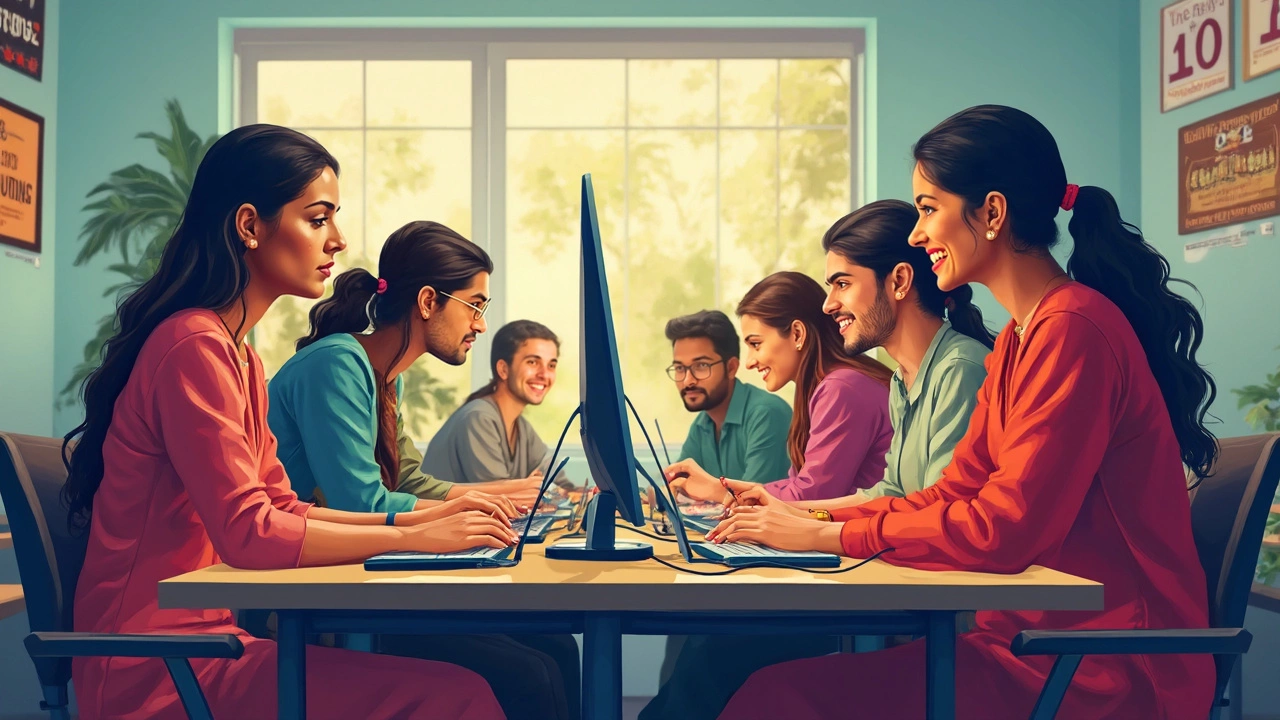Ever felt like you missed the train on learning to code just because your twenties are behind you? You’re not alone. The tech world loves showing off young coding prodigies, but here’s something real—a 2023 Stack Overflow survey showed nearly one in five beginner coders is over 30. Yep, lots of us are starting from scratch after 35.
You don’t need a degree in computer science or memories of programming in middle school to pick this up now. Some of the best web developers out there learned to code in their thirties—or even later. What matters more than your age? Consistency, curiosity, and using the right resources made for busy adults, not college kids.
If you’re wondering about job prospects, well, the story isn’t as grim as people make it out to be. Tech is short on skilled workers, and the demand for programmers isn’t dropping. If you can build things, troubleshoot, and communicate well, companies care a lot more about your skills than your birth year. Age can actually be your edge, especially in industries where experience counts just as much as technical know-how.
- Why Age Feels Like a Barrier (But Isn’t)
- How Adults Actually Learn (and Win) in Coding
- Biggest Roadblocks—And Getting Past Them
- Smart Strategies for Adult Coding Students
- What Comes Next: Careers, Growth, and Real Stories
Why Age Feels Like a Barrier (But Isn’t)
The idea that you’re “too old” to start coding at 35 usually comes from old-school beliefs or seeing too many stories about teenage breakthrough programmers. But the numbers tell a different story. A 2024 LinkedIn survey found that 38% of people making a tech career switch are over 30. And get this—tech bootcamps in the US now report their average student age hovers between 29 and 34.
So, if you’re worried about standing out like a sore thumb in a learn coding at 35 class, take a look at this data showing the breakdown of beginner coders by age:
| Age Range | Percent of Beginner Coders (2024) |
|---|---|
| 18–24 | 27% |
| 25–34 | 36% |
| 35–44 | 22% |
| 45+ | 15% |
Feeling behind is normal, especially with social media showing off “whiz kids” at every turn. But tech companies aren’t only hiring young guns. In fact, employers often notice career switchers in their 30s and 40s for their work ethic and problem-solving chops.
Here’s what usually makes folks nervous about learning to code later:
- Worrying about keeping up with younger classmates or colleagues
- Thinking you have to be a math genius (not true!)
- Feeling like there’s “too much to catch up on”
- Assuming companies want only young coders (also not true)
None of these should actually stop you. The tech world is changing so quickly today that everyone, even experienced pros, has to keep learning all the time. So whether you start at 18, 35, or 55, what matters is that you start at all—and keep going.
How Adults Actually Learn (and Win) in Coding
If you think kids have it easier because their brains are "sponges," here’s the twist: adults actually have a few secret weapons. You’ve got better focus, real-life problem-solving skills, and know what keeps you motivated. These aren’t small things—they’re why so many people succeed in coding classes for adults.
Adults learn coding differently from kids. You don’t waste time memorizing stuff you don’t need. Instead, you learn by fixing problems, working on personal projects, and asking targeted questions. That means you can go deeper, faster, if you organize your learning smartly.
Let’s look at how adults are already winning:
- They set clear, real-life goals—like automating boring tasks at work or launching a small business website.
- They pick learning formats that fit busy lives. Video courses you can pause, podcasts during your commute, and weekend bootcamps all help you make progress while juggling job and family.
- They draw from past experience. If you’ve managed a team or dealt with tricky work projects, you’re already used to breaking down complex stuff—just like you do in programming.
Coding is not just about writing lines of code. It’s about logical thinking and figuring out solutions. Many adults excel here: a 2023 Career Karma report found 46% of coding bootcamp grads in the US were age 30 and over, and employers love experienced hires who bring maturity and real-world know-how.
| Learning Format | Works Best For | Completion Rate (Adults) |
|---|---|---|
| Self-paced online | Busy schedules, flexible learners | ~25% |
| Instructor-led bootcamp | Motivation, accountability | ~73% |
| In-person evening classes | Community, hands-on help | ~55% |
The trick is not to compete with the twenty-somethings, but to use your strengths. Tap into your network, set a schedule you can stick to, and focus on actual projects. The demand for learn coding at 35 is growing because so many adults are proving it works—sometimes better than it did when they were younger.

Biggest Roadblocks—And Getting Past Them
Let’s not sugarcoat it—learning to code at 35 isn’t just about picking up another skill. You’re probably juggling a job, maybe family responsibilities, and a social life (whatever’s left of it). Adult learners have real-life stuff that teens don’t. That’s the first hurdle: time. According to a 2023 survey by Course Report, the biggest complaint from adult coding students was “fitting lessons into my daily routine.”
Next up is motivation. When you hit your first error message, you might start doubting yourself. It happens to everyone, but when you’re learning something brand new in your thirties, those moments can feel extra heavy. Richard Schneeman, a senior engineer at Heroku, put it simply:
“Everyone struggles to learn at the beginning, not just people switching careers. What matters is not giving up when you get stuck.”
Confidence can also dip because of the age difference with younger coders. Some folks worry about ‘competing’ with 22-year-olds or about ‘looking outdated.’ In reality, tech teams are a crazy mix of ages, backgrounds, and experience levels. Plus, older coders often bring problem solving skills and discipline that newbies in their twenties simply don’t have yet.
- learn coding at 35 is a search that’s surged over 50% since 2020, showing just how many adults are diving in.
- Many online bootcamps, like Codecademy and freeCodeCamp, now offer flexible, self-paced schedules geared for working adults.
- Accountability—working with a partner or mentor—has been shown to double the odds of sticking with a course after week four.
Here’s some real data from Course Report’s 2023 findings on roadblocks and how learners overcome them:
| Roadblock | Percent Facing It | Popular Solution |
|---|---|---|
| Time Management | 68% | Block calendar, smaller sessions |
| Motivation Drops | 46% | Social accountability, goals |
| Tech Overwhelm | 37% | Start slow, focus on basics |
| Imposter Syndrome | 29% | Community groups, peer chats |
If you’re struggling, try breaking your learning into 20-minute sessions, find a coding buddy online, and set micro-goals you can actually hit each week. The secret isn’t to work harder—it’s to work smarter and lean on resources built for real life, not just for college dorm rooms.
Smart Strategies for Adult Coding Students
Jumping into coding as an adult feels different from signing up for a college course or a weekend workshop at 20. Your time’s tight, responsibilities pile up, and you don’t have hours to play around all day. But you’ve got life experience, better discipline, and a clearer sense of what you want to get out of this. Here’s how to use those real-world strengths and actually get good at coding.
- Pick the right language and focus: Don’t try to learn everything at once. If you’re looking for fast results, HTML, CSS, and JavaScript open doors for web development. Data nerd? Python is friendly for beginners and powerful for analytics. Already working in a certain industry, like finance or healthcare? Target the languages popular there—SQL, Python, or even industry-specific platforms.
- Schedule regular, bite-sized sessions: Consistency beats marathon sessions every time. A 2022 Codecademy survey found adult learners stuck with coding 38% longer if they practiced just 20–30 minutes a day versus trying to cram on weekends.
- Lean on resources made for adults: Websites like freeCodeCamp, Coursera, and Udemy offer self-paced courses—often designed by people who switched careers later in life. These include project-based learning rather than just theory, which makes it stick. Don’t sleep on YouTube—channels like "Tech with Tim" or "Programming with Mosh" specialize in breaking down hard concepts for beginners.
- Build stuff that matters to you: Tackling real projects—whether it’s an app to track your workouts or a simple website for your friend's restaurant—makes the process practical and personal. Project-driven learning cements the skills and makes the work way less boring.
- Surround yourself with community: Adult learners who join Discord groups, online coding forums, or local meetups finish coding courses at noticeably higher rates. Stack Overflow, Reddit’s r/learnprogramming, and even LinkedIn groups are a goldmine for support and tips.
Need a quick look at popular resources, costs, and time to finish for adult learn coding at 35 students? Check this out:
| Resource | Typical Cost | Average Completion Time |
|---|---|---|
| freeCodeCamp | Free | 300–400 hours (Flexible) |
| Coursera (Python for Everybody) | $39/month | 3–6 months (5 hours/week) |
| Udemy (Complete Web Developer Bootcamp) | Often $20–$50 (discounted) | 40–70 hours (Self-paced) |
The best strategy: don’t just absorb info, but actually code—every day if you can. Stuck? Google it. Error messages aren’t walls; they’re breadcrumbs. Adult learners who accept that mistakes are part of the journey stick with it much longer—and get hired faster.

What Comes Next: Careers, Growth, and Real Stories
Once you get some coding chops, what does life look like at 35 or older? For a lot of folks, it means a real shot at a second (or third) career—sometimes one that pays a whole lot better. The 2024 LinkedIn Workforce Report showed that tech roles like web developer, data analyst, and DevOps engineer are seeing steady hiring, with employers caring far less about age and more about what you can build or automate.
For those who wonder about pay, let’s put some numbers on it. The latest U.S. Bureau of Labor Statistics report says the median salary for software developers in 2024 hit $127,000 a year. That’s not all at Google or Facebook—small companies and startups are just as hungry for people who know their way around code, especially if you bring in some of your own industry know-how.
Now, about growth. Tech is one field where climbing the ladder can actually speed up if you already have experience in another industry. For example, someone who spent ten years in finance and then gets into coding has a shot at fintech roles where that background is a big plus. The same goes for healthcare, logistics, or education. You’re not resetting your career—you’re stacking new skills on top of what you know.
Curious about who’s actually making this work? Check out these real-world stories:
- Sunita Bhalla learned to code at 38 while working as a school admin. She now works as a database developer at an ed-tech firm, combining her admin experience with her new skills.
- Martin Grover, a former chef, started coding after his restaurant closed in 2021. He finished a coding bootcamp and landed a remote front-end developer job within nine months—at age 41.
- Tanya Singh went through a coding class for adults at 37, eventually landing a QA engineer role at a SaaS company, partly thanks to her super-organized project management skills.
One more thing—don’t skip networking. Bootcamps, online coding communities, and LinkedIn groups can help you get that first job and keep growing. Here’s a quick data snapshot on job placement:
| Path | Average Age (Start) | Placement Rate |
|---|---|---|
| Bootcamp grads | 32 | 81% |
| Self-taught coders | 34 | 67% |
| Traditional CS grads | 24 | 89% |
Plenty of adult coders land their first role within a year after focused learning. For anyone still wondering if learn coding at 35 is a real thing—it is, and new success stories pop up every week. Tech companies just want someone who can learn, adapt, and solve problems. Age doesn’t show up in the code—or the paycheck.



